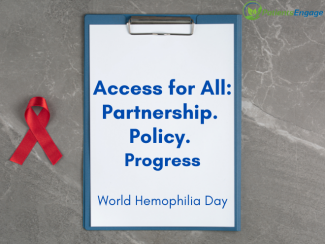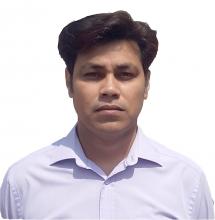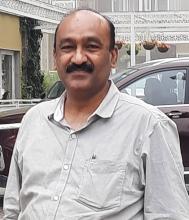
The theme for World Hemophilia Day this year is “Access for All: Partnership. Policy. Progress. Engaging your government, integrating inherited bleeding disorders into national policy”. By raising awareness and bringing hemophilia and other inherited bleeding disorders to the attention of policymakers, we can increase sustainable and equitable access to care and treatment.
We speak with 4 leading voices committed to advocacy and education for hemophilia at the national level and dedicated to bettering lives of hemophilia community. Read what Mr. Pawan Madhukar, Mr. Deepak Singhal, Ms. Indira Nair and Dr. Anupama Pattiyeri have to say.
Mr. Pawan Madhukar, CEO, Hemophilia Federation of India
Could you spell out 3 national advocacy initiatives for the hemophilia community?
Every year we observe World Hemophilia Day by conducting an event "Initiative on Hemophilia - A sensitization programme and the way forward". This year is the sixth in the series started in 2015.
This is a national level advocacy programme and the participants in this event are policy makers from the Health Ministry, Ministry of Social Justice & Empowerment, bureaucrats working under the Department of Health, Prominent Doctors, Health Care Professionals, representatives of our 90 chapters, executives of HFI and our corporate supporters.
Periodically HFI organizes regional level workshops and CMEs for both patients and HCPs to educate them on management and treatment of Hemophilia and other allied bleeding disorders.
Introductory education at the curriculum level, and continuous advanced training is necessary for healthcare personnel within the comprehensive care model. A well trained healthcare force enables smooth and efficient execution of clinical procedures and treatment protocols within the care of a PWH. Training is not to be restricted to physicians, but will be specifically designed for nurses, laboratory staff, genetic counselors, and others.

What should be done to build strength & commitment of hemophilia care programs?
(a) Provide Adequate Treatment
The World Federation of Hemophilia has established prophylactic treatment for all ages as the life for a PWH, and the prevention of chronic disability.
(b) Establish Mechanisms in place for medication procurement
A template for continuous supply of medications is possible when delineated mechanisms for the procurement are drafted and executed. A careful evaluation of the demand, supply and overall market research specific to hemophilia medication is needed prior to drafting such a policy. A collaborative team comprising the State’s Hemophilia Community, a hematologist, and the state procurement team needs to be formed. This team will focus on the safety and efficacy profile of procured medication thus ensuring quality medication for all hemophiliacs in different states.
(c) Development of Comprehensive Hemophilia Care Centers (CHCC)
CCHC is defined as a premier institution that can perform advanced hemophilia care to patients referred by a district treatment center. Services within a CCHC include, but are not limited to surgery, comprehensive diagnosis, carrier detection, genetic counselling, physical rehabilitation, and other advanced instruments of care for a PWH. At minimum, the CCHC should be available for 6 in-patient admissions at any given time.
(d) Set up Coagulation and Diagnostic labs across India
Coagulation and Diagnostic laboratories need to be set up, at a minimum, in District/ Taluk headquarters. The newly formed coagulation services will also help perform ancillary detection and diagnosis of other bleeding disorders within the country.
(e) Establish a Hemophilia Treatment Center (HTC) in each district
District Hospitals and Medical Colleges form the first line of care for PWHs. A basic team trained in handling uncomplicated episodes for PWHs, including a staff physician, nurse, and a physiotherapist is essential within the first line of care.
What are the challenges to "access for all"
Hemophilia is a genetic disease where an afflicted patient lacks blood clotting proteins Factor VIII or Factor IX. When untreated, Persons with Hemophilia (PWHs) suffer from repeated spontaneous bleeds in their joints leading to pain, lack of mobility, deformity, and ultimately chronic disability.
Globally, the incidence of Hemophilia is 1 in every 10,000 males (Population); however, the number of males in India diagnosed with Hemophilia is low (≈25000 as of Dec. 2021). Eighty percent of Hemophiliacs are predicted to be undiagnosed in India, thus making Hemophilia unattractive for government funding. The problems for Hemophilia management are further compounded by the high cost of medication and the necessity for regular comprehensive care.
While on-demand treatment facilities are available in major government hospitals across India, the levels and standards of treatment vary widely across different states. Numerous issues including long waiting periods in Government Hospitals, inconsistent availability of factor replacement products, and others have been reported by the Hemophilia community. Although numerous advances have taken place as part of the state and central government initiatives, the lack of uniformity across India remains a major stumbling block in the provision of comprehensive care to Hemophiliacs.
What support from other stakeholders would be helpful in ensuring access and the advocacy objectives?
The Health Ministry should make guidelines for Hemophilia by constituting an expert committee involving all stakeholders such as decision makers, expert hematologists and leaders of the Hemophilia community.
Other stakeholders such as corporates should support CSR programmes with additional focus on Prenatal diagnosis and Carrier Detection.Focus on the women population primarily through the Prenatal diagnosis and Carrier detection program. Combined with social and genetic counselling, this aspect of Hemophilia management is a powerful tool for education, mental preparedness, and providing the power of choice to women who are carriers and/or caregivers.
Pharma Companies can support advocacy programmes to strengthen HFI chapters
Deepak Singhal, Vice President Development, Hemophilia Federation India (HFI)
Could you spell out 3 national advocacy initiatives for the hemophilia community?
- Round the clock (24x7) treatment for all in Emergency Department with arrangement for Emergency conditions like Accidental Injuries & Life threatening Bleeds.
- International quality Factor Injections as per World Federation of Hemophilia (WFH) Guidelines should be available.
- Diagnostic & Genetic Lab establishment at least one in every state.
What should be done to build strength and commitment of hemophilia care programs?
- Factor Injections and primary treatment should be made available at all the District Headquarters and Primary Health Centre (PHC) and Community Health Centre (CHC) level wherever a Person with Hemophilia (PWH) is residing.
- Diagnostic Lab should be Established initially 1-2 in every state.

What are the challenges to "access for all"?
- Factor availability round the year 365 days.
- Factor infusion round the clock 24x7.
- Diagnostic Lab at least 1or 2 in each and every state depending upon size and area, so that patient identification becomes easier.
- At least one Hematologist should be available in state HQ Hospital.
What support from other stakeholders would be helpful in ensuring access and the advocacy objectives?
- Awareness Drive on mass level for Hemophilia.
- Diagnostic Laboratory Establishment.
- Media support to save PWH from social stigma.
- Push through Central Government to all the states for regular and timely treatment.
###########
Indira Nair, Women Group Coordinator – West, Hemophilia Federation India (HFI)
Could you spell out 3 national advocacy initiatives for the hemophilia community?
- Proper training on how to go about Advocacy to the committed representatives from all regions.
- Clear Brief Policy Note
- Proper Data on overall People with Hemophilia (PWH) Community - Statewise and Regionwise.
What should be done to build strength & commitment of Hemophilia Care Programs?
- Get united, take examples of States who are successful in getting Factor Support from the Government and follow that template/procedure with underprivileged States.
- Motivate and involve Youth and Women Group for Hemophilia Care Programs, starting at grass-root level.
- Concentrate on Psychological support for PWH and their family members.
- Free Carrier Detection and Prenatal Detection to control the birth rates of Hemophilia.

What are the challenges to "access for all"?
- Reaching out to Rural Areas and empowering the community with knowledge on Hemophilia and it's treatment options.
- Ensure Hemophilia Treatment Centres at Taluka level for easy access of Factors and proper treatment to the Hemophiliacs.
- Identifying best practices followed by Doctors/Experts
What support from other stakeholders would be helpful in ensuring access and the advocacy objectives?
- Involvement of Government officials - Chief Minister, Health Minister, Health Secretary, National Health Mission and keep Hemophilia Federation India (HFI) interactive with these Institutions for developmental progress update.
- Awareness on Hemophilia through Press and Television Media, including Digital Platforms World Hemophilia Day, World Health Day, etc.
- Support from Doctors, Hospitals and Corporates under CSR.
############
Dr. Anupama Pattiyeri, Regional Coordinator - South zone, Hemophilia Federation of India
Could you spell out 3 national advocacy initiatives for the hemophilia community?
- Advocating for a national policy on Hemophilia and other inherited bleeding disorders
- Treatment at District, Taluk, Primary Health Centre (PHC) level and 2-3 Comprehensive Tertiary Hemophilia Treatment Centres in each state (number depending on the size of the state)
- Hemophilia Federation India (HFI) will be forming a new Advocacy committee
What should be done to build strength & commitment of hemophilia care programs?
Government should partner with Hemophilia societies and include them in meetings and planning. This will help in putting our needs and expectations across the table and also in best use of resources and infrastructure.
What are the challenges to "access for all"
Inadequate Budget, non-inclusion of all inherited bleeding disorders in the programmes, lack of trained health care professionals, distance to primary, secondary and tertiary treatment centres. Another big challenge is 85% of affected people are still to be identified. Lack of screening for bleeding disorders in new live births, women with excess bleeding.
What support from other stakeholders would be helpful in ensuring access and the advocacy objectives?
Dissemination of information on bleeding disorders, about treatment centres and diagnostic facilities. For the ones who are socially isolated / underprivileged, support system to access treatment.







